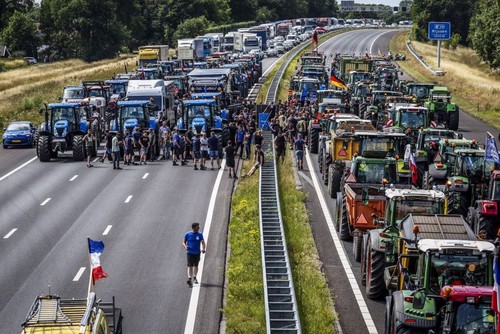 Farmers drive their tractors to block a highway near Rijssen city in the Netherlands to protest the government's nitrogen reduction policy. (Photo: Getty) Farmers drive their tractors to block a highway near Rijssen city in the Netherlands to protest the government's nitrogen reduction policy. (Photo: Getty) |
The annual forum is a venue for discussing food and agricultural policies. The theme of this year’s meeting is “Food Systems for Our Future: Joining Forces for a Zero Hunger World.”
Accelerating the implementation of SDGs
Before the forum, the organizers delivered the message that the world only has 7 years left to realize the United Nations' sustainable development goals (SDGs), one of the most important of which is to eliminate hunger by 2030. But in the current situation, the possibility of achieving that goal is threatened.
The UN Food and Agriculture Organization (FAO) and the World Food Program (WFP) say one person in ten is suffering from hunger. More than two billion people cannot afford a healthy diet.
The GFFA says that in the quest to end hunger and malnutrition around the world is facing new, and ever bigger, obstacles: climate change, biodiversity loss, the COVID-19 pandemic, and armed conflicts.
“Armed conflict destroys food systems, shatters livelihoods and drives people from their homes - leaving many extremely vulnerable and hungry. Sometimes these impacts are by-products of war, but all too often they are inflicted deliberately and unlawfully – with hunger utilized as a tactic of war,” UN Famine Prevention and Response Coordinator Reena Ghelani said.
This year's GFFA aims to promote constructive dialogue and awaken policymakers to the urgency of accelerating the implementation of the SDGs.
The Forum is focused on four topics: promoting sustainable production and food sovereignty, supporting flexible and sustainable supply chains, minimizing food loss and waste, and assisting disadvantaged groups.
2,000 policymakers, scientists, business leaders, and members of civil society organizations will participate.
The world’s largest informal Conference of Agriculture Ministers will take place on the last day of the forum. 70 ministers from around the world will adopt a joint political communiqué. High-level representatives from ten international organizations, including the FAO, the OECD, the WTO, and the World Bank, will attend the conference.
Agriculture and climate change
The GFFA is being held at a time when agriculture is one of host Germany’s major concerns. For weeks tens of thousands of farmers have protested and blocked traffic in Berlin and other places in Germany.
The protests initially demanded continued fuel subsidies, then spread to other matters, including dissatisfaction with certain climate change policies. Farmers in other European countries, too, are protesting their countries’ environmental policies, which they say are too expensive and have negative impacts on agriculture.
Farmers in the Netherlands, France, and Spain have organized large-scale protests in recent years against the Netherlands’ regulations to reduce nitrogen emissions, against Spain’s limitation of irrigation water intake from rivers, and against France’s ban on certain pesticides.
The FAO says reconciling agricultural development and climate change response is getting more difficult.
“Farms don't just have to be producers of food. They can be generators of renewable energy. Energy can then be used on the farm for the greenhouses, for pumping water, for irrigation, or energy that can be shared into the grid, or better using agricultural waste, turning it into fuels, into biofuels. All of these are really energy smart agriculture solutions, and that's exactly the kind of work that we have been doing with countries,” Kaveh Zahedi, Director of the FAO's Climate Change, Biodiversity, and Environment Office, said.
According to the FAO, agriculture produces about one-third of the world's greenhouse gas emissions each year, so it’s urgent to shift from traditional agricultural production methods toward greener, more sustainable methods.
The world must also cope with the likelihood that by 2050 at least 10% of the world's current farmland will be unusable due to climate change.
At this year's GFFA, the FAO will promote a program co-sponsored by the FAO and the Global Environmental Facility (GEF) to help countries develop environmentally adaptive agricultural food systems.
The FAO is implementing this program in more than 120 countries, with a budget of 1.5 billion USD, to mitigate 500 million tons of emissions, and sustainably manage 100 million hectares of agricultural land.